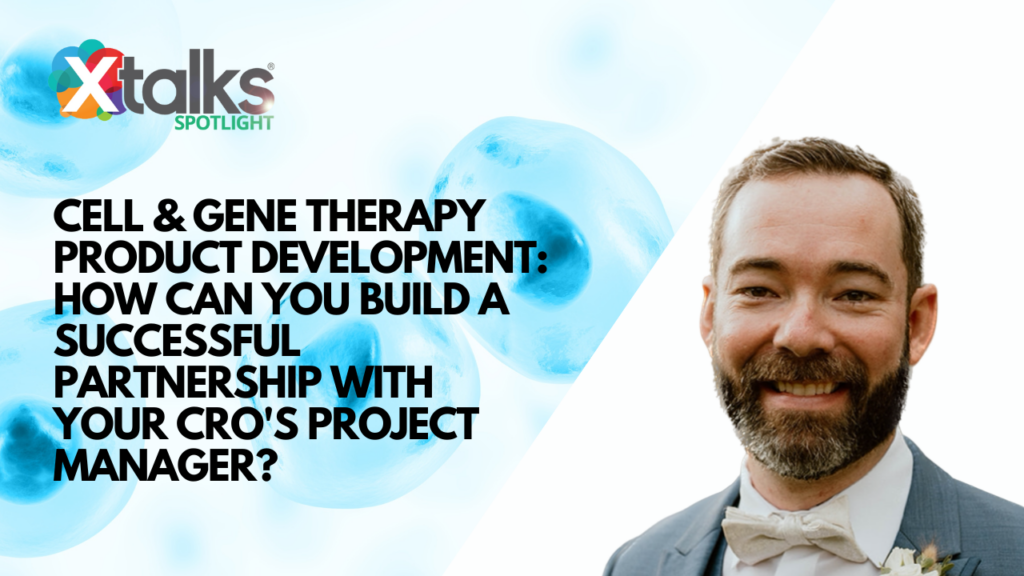Over the past few years, there has been a significant expansion in the cell and gene therapy landscape, with an increasing number of therapies entering clinical trials and receiving regulatory approvals.
The selection of a contract research organization (CRO) to support a cell or gene therapy program is crucial during the product’s development, as it can determine the success or failure of a study in meeting timelines and gathering the necessary data for approval. The project manager from the chosen CRO plays a vital role in the study’s success and needs to be experienced, flexible and responsive to the sponsor’s needs.
Worldwide Clinical Trials is advancing their commitment to the development of cell and gene therapy products and has a team of skilled project managers capable of delivering the tailored and adaptable approach to development that Worldwide is known for.

Worldwide Clinical Trials
In this Xtalks Spotlight feature, Xtalks spoke with Jake Boyd, Director of Project Management, Oncology (Cell & Gene Therapy Franchise Area Lead) at Worldwide Clinical Trials. Boyd discussed how sponsors can build a successful partnership with their CRO’s project manager to help advance cell and gene therapy clinical trials.
“We all share a passion and a common goal to bring these novel therapeutics to the market for patients that need them,” says Boyd. “I think if we all go into these relationships with this mindset, we’ll achieve great things together.”
Boyd has been a part of Worldwide Clinical Trial’s investment in CAR T-cell research and in delivering quality service to their cell and gene therapy sponsors. He has more than a decade of experience in project management, with over half of that time focusing on cell and gene therapy product development.
The Foundation of a Strong Partnership
From Boyd’s experience, one of the key attributes of a strong partnership between a sponsor and their CRO is good communication, which sets up the stage for trust and collaboration between the teams. Timely responsiveness from the CRO’s study team members is also vital for establishing sound communication.
“I always advocate for a flat communication structure so that all the team members are on the same page and the sponsor knows who they can reach out to at the CRO to help resolve any issues,” explains Boyd.
In addition, it’s crucial that the CRO understands where they can help provide input as the sponsor develops their study protocol. Boyd points out that significant trust is developed when the sponsor and CRO partner team up in the protocol development, capitalizing on the CRO’s operational and therapeutic experience.
Another integral element is timeline management. As a CRO, Worldwide Clinical Trials strives to meet the initial timelines set at the start of a study, and a big part of achieving this involves understanding the timelines that sponsors are being held to by their collaborators and investors.
“I understand the importance of hitting critical milestones like the first site activated,” says Boyd. “But if there are any shifts to these milestones due to manufacturing delays — which happens a lot in cell and gene therapy — it’s important to have an open discussion with your partners so we can help mitigate the effect of those changes and adapt the timelines.”
You can hear more from Jake on how to build a strong foundation with your CRO, including the value of effective communication structures and timeline management, by watching his full interview.
Solving Challenges in Cell & Gene Therapy Development
A robust partnership between the sponsor and the CRO can help mitigate potential obstacles in cell and gene therapy development. When asked about the challenges that can be avoided with a strong partnership, Boyd emphasized the significance of being proactive about certain requirements that clinical sites might have.
“Something I’m often coming across is the requirement from our clinical sites to have the final manuals and plans in place before they’ll even consider doing the trial or submitting to their internal committees to begin the actual startup process of the site,” says Boyd.
These plans encompass cell product handling manuals, pharmacy manuals or central lab and specialty lab manuals. Although it’s reasonable for sites to request these materials upfront to help them determine the feasibility of their participation, Boyd says many sponsors tend to consider this aspect after protocol development.
“If you have a solid partnership established with your CRO project manager early on, it’s an opportunity to delegate the responsibility of reviewing product handling manuals and plans to the CRO,” Boyd comments, highlighting the importance of a sound CRO partner in helping to review these critical elements to ensure there’s no delay in site activation. During the interview, Boyd expands into more detail on how a CRO partner can help prepare the final manuals and plans for clinical study sites.
Navigating the Logistics of Cell & Gene Therapy Studies
The logistics of cell and gene therapy studies can be quite complex. A multitude of variables come into play, such as the type of cells being transported and whether the therapy is autologous or allogeneic.
Boyd emphasized the value of transparency between the CRO, sponsor and their manufacturing partners to avoid having situations where the clinical site is patient-ready, but there aren’t any slots available to begin the process soon.
Another key factor in logistics is the transportation of biological specimens. Various specialized laboratories are engaged in the analysis of blood and tissue samples for cell and gene therapy research. Boyd stressed the importance of providing detailed guidelines and instructions to site teams to ensure these specimens are delivered to the correct destinations within their stability window.
“At Worldwide in particular, we’ve done a great job of being able to be flexible in providing logistics coordinators to our sponsor partners to integrate with their team,” says Boyd. “That’s just another great area where we can support the entire vein-to-vein process.”
The Future of Cell & Gene Therapy
Boyd’s passion for cell and gene therapy was evident as he spoke of his excitement about future developments in the field. He pointed out that a large proportion of cell and gene therapies that have advanced to date have been targeted for hematological and certain rare conditions. With the advancements in technology, new research to expand these therapies into additional solid tumors and rare disease areas is occurring.
“I’m really excited to see what we’re able to move into the clinic over the next few years,” says Boyd. “One of the biggest reasons I came over to Worldwide was because I knew I’d be surrounded by a group of people that share my passion for cell and gene therapy.”
Hear more from Jake about overcoming obstacles and mitigating potential risks in cell and gene therapy trials by watching his full interview.
To further disseminate insights on overcoming operational challenges in cell and gene therapy trials, Boyd and his colleagues at Worldwide Clinical Trials will be speaking on a free webinar in June. The speakers will share the most common challenges and questions they hear from their CAR T sponsors.
In a rapidly evolving field like cell and gene therapy, a strong partnership with a CRO’s project manager can make the difference between a successful study and a failed one. As Boyd’s insights illustrate, effective communication, proactivity and shared passion are critical components of this partnership. As we look forward to the exciting developments in the cell and gene therapy field, such partnerships will undoubtedly play a crucial role in bringing life-changing therapies to patients.
This article was created in collaboration with the sponsoring company and the Xtalks editorial team.






Join or login to leave a comment
JOIN LOGIN